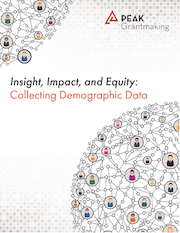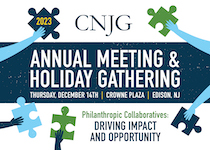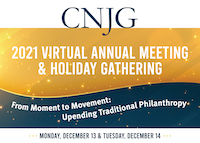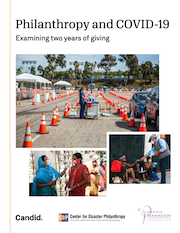Site Search
- resource provided by the Forum Network Knowledgebase.
Search Tip: Search with " " to find exact matches.

Grantmakers occupy a powerful space of privilege in the social change sector. As such, they have a unique opportunity—and responsibility—to work proactively toward equity and inclusivity. Increasingly, grantmaking institutions are challenging themselves to live their values through their grantmaking practices.
For philanthropy to advance equity in all communities, especially low-income communities and communities of color, it needs to be able to understand the demographics of the organizations being funded (and declined), the people being served, and the communities impacted. That data should be used to assess practices and drive decision making.
PEAK Grantmaking is working to better understand and build the capacity of grantmakers for collecting and utilizing demographic data as part of their grantmaking.
“A Time for Action: Mobilizing Philanthropic Support for Boys and Young Men of Color” lays out a vision and a bold plan of action to maximize the potential of philanthropy and the private sector to increase opportunity for boys and young men of color that benefits the entire country. While it focuses on systems, policies, and practices that profoundly shape the lives of our sons and brothers, the recommended actions also help to create the conditions for all children and young adults to thrive, regardless of race, ethnicity or gender. The plan is bolstered by $194 million in initial investments in key initiatives, including for example programs to enhance school learning environments and reduce the overrepresentation of young people in the justice system.
Join us for this Health & Aging Affinity Group meeting, a unique opportunity for New Jersey-based funders to connect and share insights on initiatives and strategies related to health and aging. This engaging event will provide a platform for networking, knowledge exchange, and fostering potential partnerships among organizations dedicated to improving the well-being and quality of life for families in our communities. Let's come together to explore innovative solutions, share best practices, and build a stronger, more impactful funding network in the realm of health and aging.
Cost: Free for CNJG Members; $50 for Non Member Grantmakers
Philanthropic Collaboratives:
Driving Impact and Opportunity
 Thursday, December 14, 2023 - 9:00am to 3:00pm
Thursday, December 14, 2023 - 9:00am to 3:00pm
Luncheon, Keynote Presentation & Workshop
Location: Crowne Plaza Edison, 2055 Lincoln Highway, Edison, NJ 08817
The Council of New Jersey Grantmakers thanks everyone who attended our 2023 Annual Meeting & Holiday Luncheon and the Pre-Meeting Workshop that explored Philanthropic Collaboratives: Driving Impact and Opportunity. We were thrilled to reconnect with friends and colleagues and meet new members.
At the Business meeting, the membership elected the new class of Trustees. We also honored our outgoing Board Chair, Jeff Vega, for all the incredible work he accomplished during his term. After lunch and networking time, we listened attentively to Nidhi Sahni, Partner and Head of US Advisory Group, New York, Bridgespan, and Lucy Vandenberg, Executive Director of the Schumann Fund for New Jersey in conversation about the nuances and benefits of collaboration.
At the pre-meeting workshop, Tools for Funder Collaboration, presented by John Harper, Chirlie Felix, and Waheera Mardah of FSG, members were presented multiple models of collaboration and examples of collective impact followed by an opportunity to engage in dynamic discussion to further explore the concepts.
CNJG members can view the FSG PowerPoint and additional resources from the event on the resources tab, when logged in.
CNJG is pleased to offer this series of webinars to our members, hosted by our partners at the Center for Disaster Philanthropy.
With COVID-19 there seem to be more questions than answers, particularly for funders who want to respond effectively and efficiently. This series of seven webinars will bring expert panelists together to address some of the most pressing issues, including getting money out the door quickly, supporting vulnerable populations and managing other disasters in the midst of the pandemic.
Join the Center for Disaster Philanthropy for one or multiple webinars to gain a better perspective on the role of philanthropy in COVID-19 response and recovery.
Cost: Free for CNJG members and Nonmember Grantmakers
CNJG thanks the Center for Disaster Philanthropy for hosting this series.
Upcoming Webinars in this Series:
June 23: Managing a Global Response
July 14: How Funders Can Support Bereavement and Grief
Past Webinars in this Series:
April 14: Making Effective Rapid Response Grants
April 28: Managing Multiple Disasters Amid the Pandemic
May 12: Place-based Grantmakers and Investing in Local Communities
May 26: How Philanthropy Can Stand Up for Vulnerable Populations

From Moment to Movement: Upending Traditional Philanthropy
Dates & Time:
Monday, December 13 - 2:00 to 3:30 pm -- Annual Meeting Workshop
Tuesday, December 14 - 12:30 to 2:00 pm -- Business Meeting & Keynote Presentation
The Council of New Jersey Grantmakers thanks everyone who attended our 2021 Virtual Annual Meeting & Holiday Gathering.
The 2021 Annual Meeting, From Moment to Movement: Upending Traditional Philanthropy, tackled how we can implement practices based in trust, confront uneven power structures, and advance equity in the philanthropic sector.
Our Annual Meeting Workshop on December 13 explored how two foundations, The Claneil Foundation and Weingart Foundation, are using general operating support, multi-year funding, and transparent communication and feedback to build strong, effective relationships with nonprofit partners. Afterwards, funders discussed where they want to move the needle in their own organization, and the major barriers to implementing those changes.
On Day 2, we heard an inspiring keynote presentation from Marcus Walton, President and CEO of Grantmakers for Effective Organizations (GEO). Marcus kicked off the keynote by sharing critical insights for building trust within and outside your organization. He then engaged in a candid conversation with CNJG President and CEO Maria Vizcarrondo, and answered questions from attendees, on how to reach communities, rethink traditional grantmaking practices, and advance racial equity within philanthropy and New Jersey.
Philanthropy needs to change to meet this moment. Breaking away from ingrained structures and replacing outdated “best practices” with strategies based in trust and power sharing is a long and challenging road for many grantmaking organizations. There will be growing pains. But, during this year’s Annual Meeting & Holiday Gathering, we heard about effective strategies from courageous leaders that have made these changes possible. Join us in 2022 as we continue to rework, reimagine, and operationalize new practices that better serve our partners and communities.
CNJG members can view recordings from the event and additional resources when logged in.
In 2003, with member support, CNJG commissioned a report on the impact a potential conversion of Horizon Blue Cross Blue Shield to a for-profit might have on access to health care in New Jersey. Research from the Center for State Health Policy (CSHP) at Rutgers University, provided details about the law governing such conversions in New Jersey and the experience of other states with conversions. The report identified questions raised in other states when such conversions occur, especially about the valuation of assets, the impact on low-income families, and the operation of the philanthropic foundations that have been established as stewards of the assets generated by the conversions. CNJG’s purpose was to seek answers to critical questions relevant to the availability of healthcare coverage for New Jersey’s citizens and to discuss models of best practice for healthcare conversion foundations across the United States.
The New Jersey Historic Trust, an affiliate of the New Jersey Department of Community Affairs (DCA), today approved a total of $15,758,315 in grant recommendations from the Preserve New Jersey Historic Preservation Fund to save and promote historic sites throughout the state. Sixty-five preservation planning, heritage tourism, and capital projects are included in this year’s list of recommendations.
“The New Jersey Historic Trust is committed to its mission of saving and telling New Jersey’s history,” said Lt. Governor Sheila Y. Oliver, who serves as DCA Commissioner. “This round of grant recommendations for preservation planning, heritage tourism, and capital projects will help to preserve historic structures, documents, and artifacts that tell the stories of New Jersey’s history to future generations.”
Of the 65 grant award recommendations, 27 will help fund preservation planning projects such as condition assessments, historic structure reports, archaeological investigations, and construction documents; one grant will help fund heritage tourism initiatives to improve the visitor experience at historic sites; and 37 grants will fund capital preservation projects on sites listed in the New Jersey Register of Historic Places. All grants awarded to nonprofit organizations or entities of municipal, county and state governments require a match from the recipient.
How can funders reduce the burden on grantees when requesting demographic data? What information are funders collecting from their nonprofit partners, and what information is needed to make informed decisions and build trusting relationships?
Funders are increasingly requesting demographic data from nonprofits to better understand the types of organizations and leaders that they are—and are not—supporting. Due to the lack of comprehensive and public demographic data available, nonprofits experience a heavy burden to provide the information in a variety of ways and formats.
Join this webinar to learn how to reduce the administrative work for grantees throughout the due diligence and grantmaking processes and beyond. We’ll explore tools that can help streamline the process of collecting, evaluating, and sharing information for mutual benefit.
Cost: This event is free for CNJG Members who are family foundations.
Other types of foundations are ineligible to join this webinar.
This program is a CNJG membership benefit for family foundation members, including staff and trustees, in partnership with the National Center for Family Philanthropy.

The second year of the coronavirus pandemic began optimistically with the promise of multiple, effective vaccines. However, 2021 proved to be a challenging and complex year. The pandemic continued to put pressure on economies and societies, exacerbating inequities, and hitting poorer, historically marginalized communities the hardest. Through it all, nonprofits continued to play an essential role, providing critical services, trusted information and a variety of resources.
In the report titled “Philanthropy and COVID-19: Examining two years of giving,” Candid and the Center for Disaster Philanthropy examine $1 billion in philanthropic funding for COVID-19-related efforts during 2021 to see how donors responded in the second year of the pandemic.
This report will assist donors as they consider how to invigorate their COVID-19 giving strategy to support equitable, holistic community recovery from the pandemic.
After more than 15 years promoting grantmaker practices that support nonprofit results, GEO is convinced that a strong culture inside foundations is critical for effective philanthropy. It’s virtually impossible to operate as an ally and partner to nonprofits if you are working inside a foundation whose values and culture run counter to that spirit.
GEO defines culture as “the collective behaviors and underlying assumptions of an organization.”
GEO is focusing on culture because of what we hear in our conversations with foundation leaders, staff, board members and nonprofits across the country. People at all levels in their organizations regularly tell us how an unproductive culture can get in the way of what their foundations have the capacity and the potential to achieve. They share that successful grantmaking — grantmaking that supports nonprofits to achieve meaningful results — requires more than a great strategy and execution plan; it also requires an intentional focus on culture.
ASAE & The Center for Association Leadership's landmark study and publication 7 Measures of Success identified the ability to build effective alliances or partnerships that advance the mission as one of the hallmarks of a remarkable association. But getting a partnership right is an involved undertaking. That's what The Power of Partnership, itself the result of a strategic research collaboration of ASAE & The Center and the U.S. Chamber of Commerce, is all about. The book takes a no-nonsense look at the intricacies of establishing successful partnerships between nonprofit organizations, between nonprofits and for-profit companies, and between nonprofit organizations and governmental entities.

